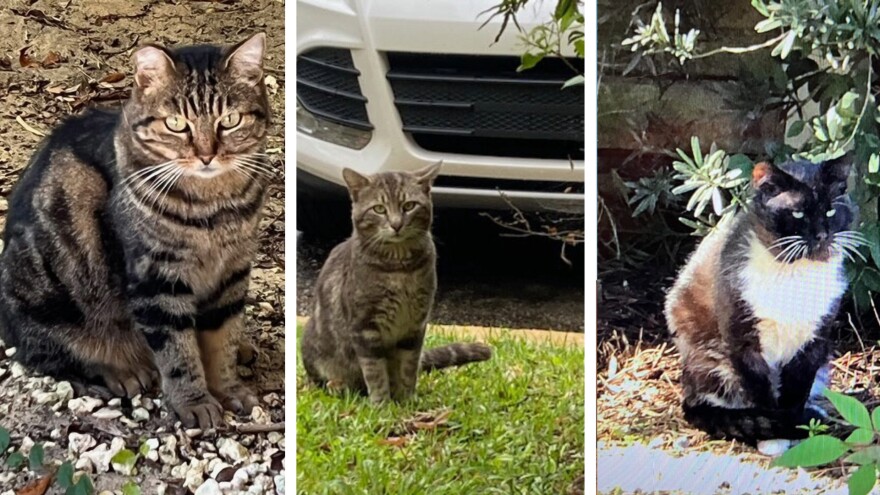Since 2017, a dedicated group of volunteer students and faculty at the University of West Florida has been working to reduce the number of stray cats on the Pensacola campus. The Campus Cat Program appears to be having some success in addressing what has been a decades-long problem.
The program began as a humane alternative for dealing with stray cats on campus after Nicole McDonald started receiving complaints.
Support Local Stories. Donate Here.
“There [were] some people here and there feeding them and taking care of them,” said McDonald, “We sat down with some local organizations, Animal Alliance, and Everett Animal Group, to figure out how do we deal with them because we didn’t want to just trap them and have them euthanized.”
Six years later, the program is still going strong.
“We came up with a plan to coexist with our cats on campus,” said McDonald, “We got our task force run through the [Vice President] of finance and administration and up to Dr. Saunders at the time who agreed we had a good plan. It’s been a good program. We have been able to eradicate the problem and we have humanely managed them on campus and found homes for a bunch of them.”
Brandi Winkleman, president of A Hope, a nonprofit organization in Santa Rosa County, says she is grateful to have the program to help address the problem.
“The overpopulation crisis in this area, northwest Florida, is extremely high,” said Winkleman. “And a problem for animal shelters and for people in the community who are caring for these [cats]. People think, just take them to the shelter and have them put down or adopted out. I mean, you can't adopt out a feral cat. You really have to get in front of the situation, and you have to think proactively versus reactively.”

TNR — or Trap Neuter Release — has been the answer to the area's growing population of stray cats and kittens. Volunteers also ensure the cats are fed every day at a set time and are consistently monitored for injury and overall health.
“It's about taking care of the animals that are already there and maintaining the health of that community of cats and the people that take care of them,” said Winkleman. “Go ahead and get them fixed, stop the cycle so there's not so many who are fighting over food, as well as feed them regularly so they know that there is food coming out for them at certain times of the day.”
The Campus Cat Program volunteers go to great lengths to make sure the cats are cared for consistently.
“We feed the cats every day,” said McDonald, “Even during holidays, even during closures, even during hurricane closures. And if we notice that any have any medical issues, if we are able to trap them again to get them medical help, we will. Sometimes it’s a little difficult to trap the feral ones. They know what the trap is and don’t want to go back in it the second time. But we do our best to keep them healthy.”
Kittens who are trapped may be fostered until they’re old enough for surgery or socialized for adoption. Thanks to the program, McDonald said they’ve not had a big need for kitten fosters.
“We, should say knock on wood, have not had any kittens in the last…probably year,” said McDonald. “But there was a time where we were getting a couple of litters of kittens each year that we needed to find foster homes for until they were old enough to go somewhere. Because of the success of our program, we don’t need as many fosters, but we never know. That number could change in the blink of an eye.”
The Campus Cat Program is an official University of West Florida-sanctioned program and as such falls under the University banner of organizations. However, this is a volunteer-run, publicly funded program, and the biggest limitation faced is financial funding. Donations are always welcome.
“We never know when we may need funding to pay for vet care,” said McDonald, “You can donate through your paycheck to any foundation account, and the UWF ‘campus cats’ is on the list. And the general public can donate too, as well.”
For those looking to adopt a UWF campus cat, friendly and socialized cats are occasionally available.
For more information, contact Nicole McDonald at nmcdonald@uwf.edu.


